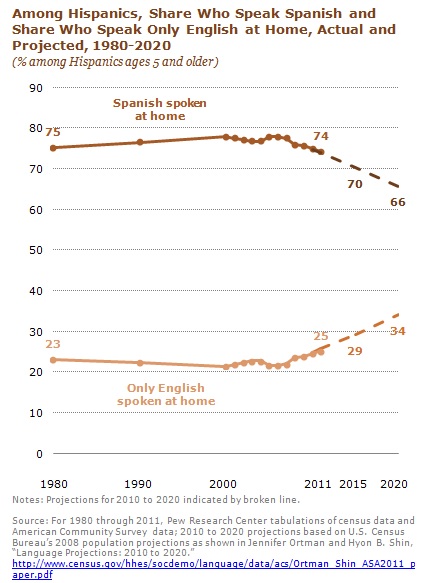Hablas español?

Photo courtesy of Pew Research Center
In addition to this research provided by the Pew Research Center, The Children of Im-migrants Longitudinal Study released a public report that found that 17 percent of third genera-tion Mexican-Americans speak Spanish, and fourth generation Mexican-Americans were speak-ing at a 5 percent rate.
Non-Spanish speaking Mexican-Americans often argue that they don’t need to speak Spanish to validate their Mexican identity, while technically true, it’s also not true.
The most common argument, one which has onset the fashioning of many “memes” (basically pictures with captions) is that Spanish is the language of Mexico’s colonizers and therefore knowing it doesn’t make you any more Mexican.
This point is typically argued in the English language, yet another language of colonizers. Unless that argument is made in Nahautl, Yucatec Maya, Mixtec or any other of the indigenous languages spread out in Mexico, those who argue the point are not making themselves look any better.
While it is hard to gauge what makes one more or less Mexican, there will certainly never be a universal definition. However, grasps at a tangible meaning can begin with the literal definition. Sure, Merriam-Webster isn’t the end-all of culture, but it’s a good starting point. Its third defining point on the word Mexican reads: “a person of mixed Spanish and Indian descent.”
A Mexican, synonymous with “mestizo” (meaning mixed blood) is not indigenous, nor are they fully Spanish, neither is the Spanish language they use. Mexican Spanish has various dialects throughout its regions, and therefore, in reference to the former argument, Mexican Spanish is not the language of the colonizers at all.
In fact, the words “Mexico” and “Mexican” linguistically originate from the clash of Spaniards and indigenous natives, formal Spanish language had to compromise and bend to the will of native tongue creating what is used today throughout North America.
Now, being Mexican-American is already tough in terms of claiming Mexican identity; “Ni de aquí ni de allá” is a popular phrase used when Mexican-Americans refer to themselves. It means, “neither from here, nor there.” If on top of that, a Mexican-American doesn’t know Spanish they’re definitely from “there” in the eyes of native-born Mexicans. Many of which reside in the U.S., even here in Chicago.
The reason being: You can’t communicate with your fellow Mexicans. The language barrier alienates a Mexican-American further into the American spectrum (though not really since Americans won’t see the Mexican-American as American, but that’s a topic for another time) and becomes what’s known as a gabacho/a: an outsider, a foreigner, an American, etc.
What’s most concerning for Mexicans when a Mexican-American doesn’t speak Spanish is that the Mexican footprint is being lost in a homogeneous America. To lose Spanish is to lose the culture may seem like a radical statement, but not outlandish. Those Mexican-Americans who speak Spanish or even minimal Spanish typically have phrases or words that must be recited in Spanish, either for lack of translation in English or out of mere habit. In either of those cases, the mere speech of the words contains nostalgia and connection in what is and was Mexico.
Reciting the Mexican Spanish language medicates the split soul of the Mexican-American, it emulsifies the outward American citizen into the inward sole mestizo, which with nourishment, creates a whole. If even for a while.
To be fair, Mexican-Americans who are void of Spanish probably didn’t grow up in a Spanish-speaking household. And with all that said, Mexican-Americans who don’t know Spanish should not be persecuted or denied their claim at a Mexican identity. However, they should be aware of the impact it can have on their lives and their connection with a Mexican identity.
Without proper care, the mestizo tongue could be ostracized from future Mexican-American identities leaving only Anglo-Saxon pronunciations of the powerful poetry that is Mexican Spanish.
Your donation will support the student journalists of Northeastern Illinois University's The Independent, either in writers' payment, additional supplies and other items of note. Your contribution will allow us to purchase additional equipment for writers/photographers/illustrators and cover our annual website hosting costs.
Emmanuel Gonzalez






sajeewa • Oct 24, 2015 at 1:54 am
good
Rafael Sánchez • Oct 7, 2015 at 3:51 am
Totalmente de acuerdo y no solo eso, sino que además lo que une a los latinos de distintos orígenes es el idioma español. El inglés hay que aprenderlo, pero el español NO se puede olvidar y para eso hay que usarlo. Si no le gusta a Trump, es señal de que vamos por buen camino.
Saludos.